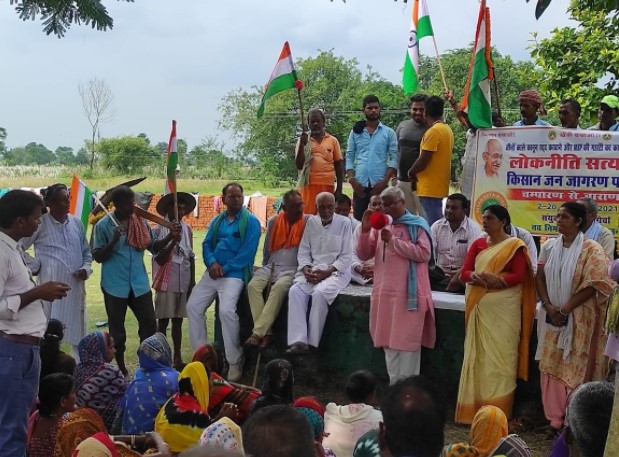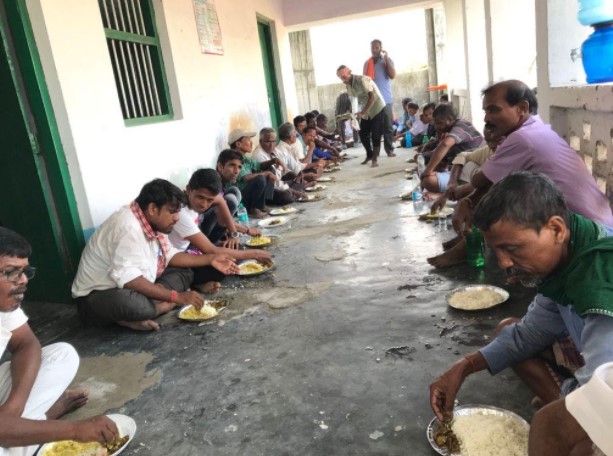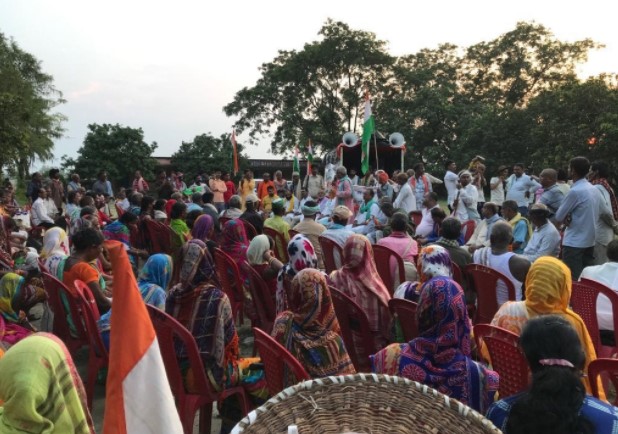Farmers’ March from Champaran to Varanasi Reaches UP Border
‘How long will the government remain a puppet in the hands of the corporates?’
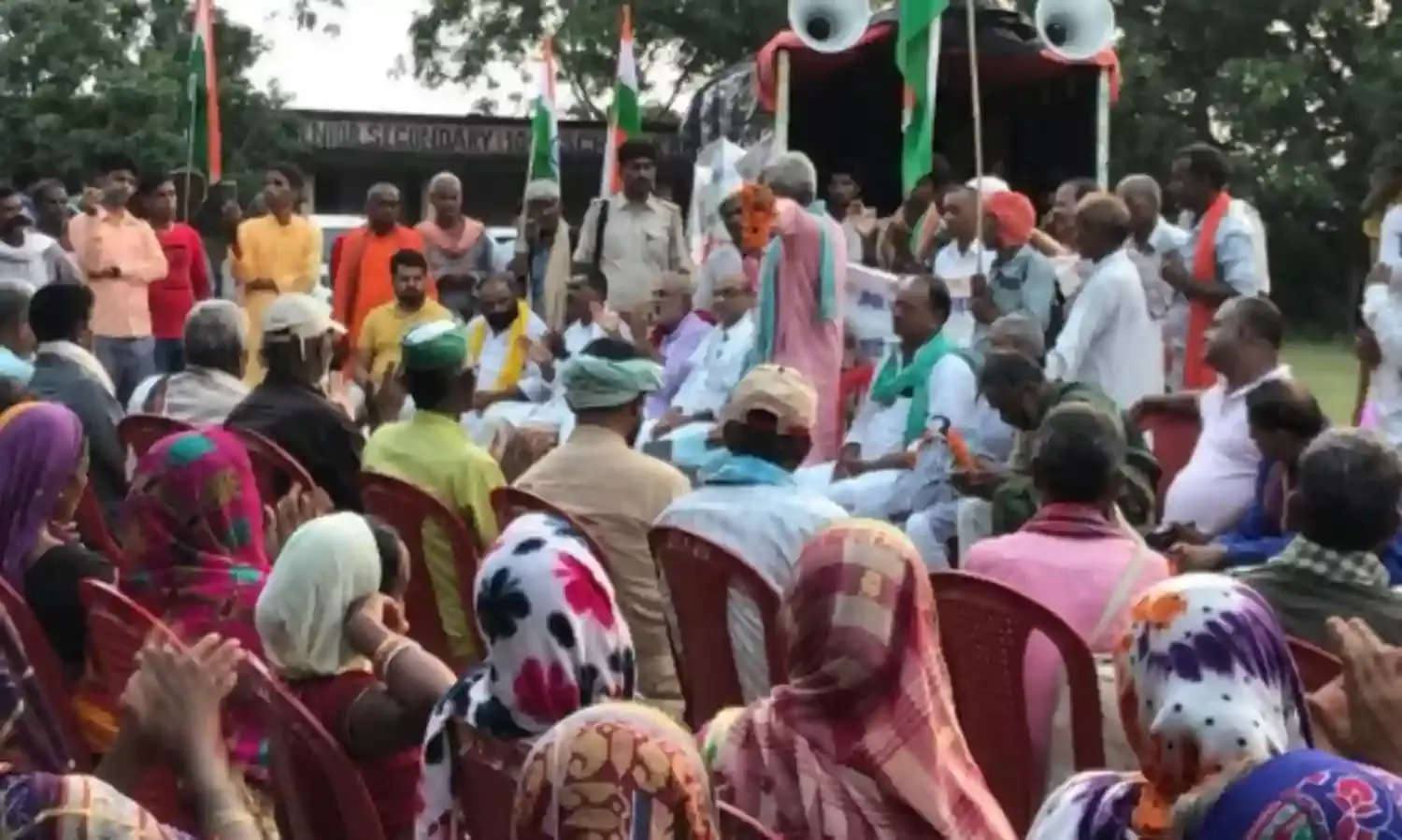
Away from the media glare on developments in the Lakhimpur Kheri deaths, farmers are scripting history in Bihar and Uttar Pradesh. They are carrying out a Lokniti Satyagraha, with a march from Champaran in Bihar to Varanasi in Uttar Pradesh to raise the demand for scrapping the three farm laws and ensuring minimum support price for all farm produce.
The 350 km march commenced from Champaran on October 2 and by Friday evening the participants had completed 150 km of their journey, having reached the border of Bihar at Majhighat from where they were to move to Sitabdiyara, native village of Jayaprakash Narayan, on Saturday.
This Kisan Janjagran Padyatra (Farmer Awakening March) has been organized by Navnirman Kisan Sangathan, a farmer group with its roots in Odisha, Bihar and Uttar Pradesh. The organization is also a part of the umbrella Samyukta Kisan Morcha conducting the nationwide protests against the “pro-corporate” government.
“Through this event we are marking 104 years of Mahatma Gandhi’s historic Champaran Satyagraha. It was Gandhi’s first Satyagraha with participation of farmers in India, and the issues being faced by the peasantry today are quite similar.
“If the previous Satyagraha was against the contractual indigo farming imposed by the British colonizers, the present government too is trying to impose contractual farming and anti-people farm laws on the masses.
“If Gandhi led the fight for Azadi from the British, our fight is to protect this independence from our own government,” said Himanshu Tiwari, convener of the ongoing satyagraha.
Varanasi, the marchers’ destination, is also the constituency represented by Prime Minister Narendra Modi in Parliament.
“It is the Prime Minister who is supposed to listen to the masses and withdraw the laws and nobody else,” Tiwari told The Citizen.
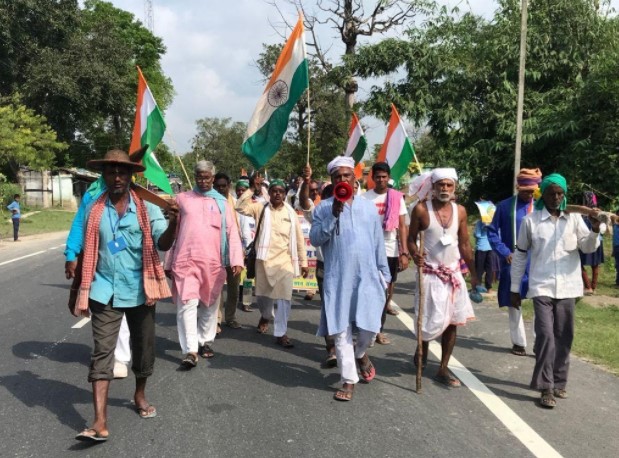
The march will likely have electoral repercussions, particularly in Uttar Pradesh which goes to polls four months from now and where the BJP government led by Yogi Adityanath is already facing the heat on farm issues. There was a stupendous response to the farmers’ mahapanchayat in Muzaffarnagar in the western part of the state on September 5, and widespread anger now over the Lakhimpur Kheri killings.
“One of the main reasons for organizing the event was to dispel the claims of the government and its propagandists that the farmers’ movement is confined to just Punjab, Haryana and western Uttar Pradesh. It is evident that the farmers in Bihar, Odisha, Uttar Pradesh and Jharkhand are aware of what is going on in and around Delhi,” said Tiwari.
“We had earlier carried out a Jai Kisan Yatra traveling across the states by bus in January. The farmers understand that the issue of three black farm laws and the demand for MSP is a common issue concerning everyone on the ground.”
The marchers have been walking from village to village carrying the tricolour and shouting slogans glorifying the motherland as well as slogans like Inquilab Zindabad to motivate the masses.
There are 1,000 marchers who will cover the entire 350 km stretch, touching hundreds of villages in their attempt to reach out to their brethren. These marchers include 100 women. There are people from all communities and social strata. The majority of participants are from Odisha, Bihar and Uttar Pradesh, with some from Punjab, Haryana, Madhya Pradesh, Jharkhand and Rajasthan accompanying them.
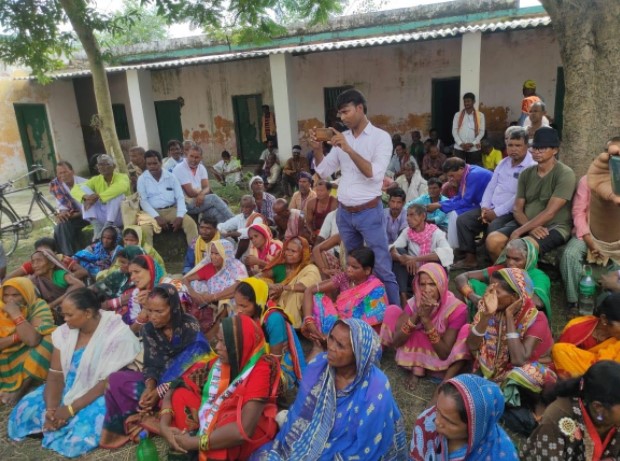
The organizers say they have been getting a response beyond their expectation. A reception committee along with village residents is there to receive the Yatra at every village, where the marchers hold nukkad or panchayat sabhas telling the people why they need to organize themselves to fight for their rights.
Observers say it is the actual decentralization of democracy on display in these villages. They say walking in the hot and humid conditions is not an easy task, but the “positivity” they have been receiving from the “moral victory” of the Delhi movement drives them on.
The villagers organize for their food and rest. The marchers sleep at places like the school premises or panchayat ghars where they halt for the night. Villagers accompany the marchers from their village to the next stop, walking a few kilometers with them in solidarity.
In the course of their interactions with village residents, the marchers have been posing 10 questions to the prime minister that cover the burning issues being faced by the masses of the country.
. Why these undemocratic decisions in a democratic country? Why has your conscience not awakened to meet the farmers even after 600 farmer deaths?
. When will you withdraw the three black farm laws?
. Why is there no legal guarantee on MSP?
. When will you decide on giving employment to the youth?
. Why are families in India not getting any reprieve from inflation?
. Who is responsible for the failure of the system during the Covid-19 pandemic?
. Why are all important issues like education, healthcare, employment, inflation, remunerative pricing not on your agenda even after so many years of your coming to power?
. Who is responsible for the migration of labour and the ever increasing economic disparity?
. How long will the government remain a puppet in the hands of the corporates and multinational companies?
. How long will the government allow the plunder of natural resources?
The event is being seen by many as something that will define politics in this part of the country in days to come.
